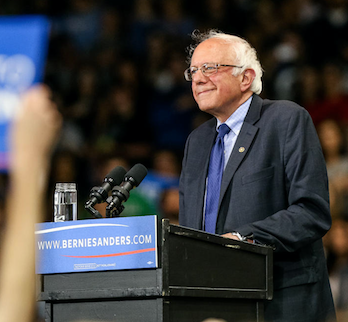Bernie Sanders won the West Virginia Democratic primary Tuesday evening. He has now won 19 primaries to Hillary Clinton's 23. Not counting superdelegates, the two are less than 300 delegates apart.
As expected. Donald Trump won the Republican presidential primary in West Virginia and also in Nebraska.
Looking to November, a new Quinnipiac poll shows that Sanders runs stronger than Clinton against the presumptive GOP presidential nominee in three swing states: Ohio, Florida and Pennsylvania.
In Florida the poll says voters split 48 – 48 percent on whether the U.S. should build a wall along the Mexican border. White voters want a wall 55 – 41 percent, with non-white voters opposed 65 – 31 percent. Peter A. Brown, assistant director of the Quinnipiac Poll says “Republicans’ weakness among minority voters is well known. But the reason this race is so close overall is Clinton’s historic weakness among white men. In Florida, she is getting just 25 percent from white men."
After his win in West Virginia, Sanders reaffirmed what he has been saying, that he is going to remain in the race. "We are in this campaign to win the Democratic nomination and we’re going to stay in the race until the last vote is cast. We expect more victories in the weeks to come when voters go to the polls in Kentucky, Oregon, the Virgin Islands, Puerto Rico, California, Montana, New Jersey, New Mexico, North Dakota, South Dakota and the District of Columbia.
“We fully acknowledge we have an uphill climb ahead of us, but we’re used to that. We have been fighting uphill from the day this campaign began. And after all the votes are cast and counted and this contest moves to the Democratic National Convention in Philadelphia, the delegates will decide which candidate is the strongest nominee to take on Donald Trump in November. All of the evidence indicates that I am that candidate."
Sanders and Clinton have agreed to another Democratic debate in California in advance of that state's June 7th primary.
